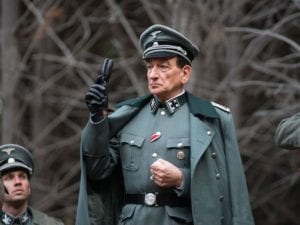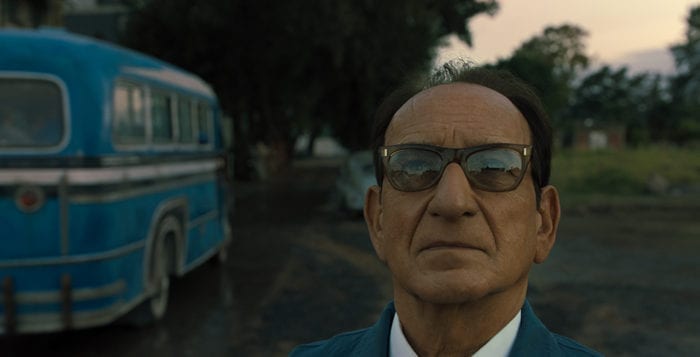By Jeffrey Sanzel
“Operation Finale” depicts the Israeli secret agents who extracted notorious S.S. Lt. Col. Adolf Eichmann from Buenos Aires. Directed by Chris Weitz, with a screenplay by Matthew Orton, this is a taut historical thriller using Mossad agent Peter Malkin’s book, “Eichmann in My Hands,” for its source.
Eichmann was considered the architect of the Final Solution. It was he who masterminded the transportation logistics that brought millions of innocent Jews to their deaths in concentration camps across Europe. In writing of Eichmann, Hannah Arendt referred to “the banality of evil” — an “ordinary” man who expressed neither remorse nor responsibility for his hideous actions, the epitome of “just following orders.” He has been represented in books, plays and films throughout the latter half of the twentieth and well into the twenty-first century.
Mossad agent Isser Harel’s The House on Girabaldi Street(1975) was turned into a television movie in 1979. The Man Who Captured Eichmann(also using Eichmann in My Hands) explores much of the same territory. Robert Shaw’s playThe Man in the Glass Booth(and subsequent film) were inspired by Eichmann’s trial. Eichmann has been portrayed by Robert Duvall, Stanley Tucci, Donald Pleasance, Maximillian Schell, Werner Klemperer, and Alfred Burke.

In “Operation Finale” the year is 1960 and the Mossad, Israel’s intelligence agency, is given information that points to Eichmann having escaped to Buenos Aires where he now lives under the alias Ricardo Klement. The film follows the covert mission of a small band of agents as they confirm, capture and finally transport Eichmann to Jerusalem to stand trial.
Prime Minister David Ben-Gurion (in a strong cameo by Simon Russel Beale) imparts the importance of the mission: “Our memory reaches back through recorded history. The book of memory still lies open. And you here now are the hand that holds the pen. If you succeed, for the first time in our history, we will judge our executioner. And we will warn off any who wishes to follow his example. If you fail, he escapes justice, perhaps forever. I beg you. Do not fail.”
It is a delicate balance to blend a Holocaust drama with a thriller. It is a fine and often dangerous line when representing anything that touches on this topic. While the movie does not take place during the Holocaust, it is clearly part of its aftermath and therefore must be approached as carefully and as honestly as possible. For the most part, the film succeeds, working best when the two leads engage.
Oscar Isaac plays Mossad agent Peter Malkin, while Ben Kingsley is Eichmann, his emotionally manipulative arch-nemesis. These are two masterful actors delivering powerful, understated performances. It is their scenes that resonate most strongly.
Isaac displays the conflict of the character’s desire for revenge (his sister and her children, murdered in Lublin, are represented in visions that haunt him throughout) weighed against the need to bring Eichmann to justice on the world stage. His struggle is both painful and vivid. Kingsley — who has portrayed Holocaust survivors Itzhak Stern in “Schindler’s List” and Otto Frank in “Anne Frank: The Whole Story” — delivers a disturbingly subtle and emotionally complicated Eichmann in an unnervingly nuanced performance.
There are moments that are chilling in their simplicity: watching Eichmann counting train cars with his very young son as the agents spy on them; Malkin shaving Eichmann with a straight razor; Eichmann’s casual question, “Who did we take from you, Peter? Who did you lose?”; a sleeve revealing a blue tattoo.
The tension and conflict among the captors themselves, who each bring varied points of view, highlights their humanity, and lends further texture to the film. In addition, this is a dangerous Argentina, with a harrowing scene depicting a gathering of Nazis and Nazi sympathizers. There is a clear sense that the government is more than complicit in its protection of these murderers. These elements enrich the world in which it is set.
The film is brisk and focused and the performances are uniformly strong. In supporting roles, Nick Kroll, Michael Aronov and Mélanie Laurent (all part of the Mossad team) are particularly noteworthy. While occasionally exchanging depth for dramatic tension, overall, “Operation Finale” is an engaging and often disquieting account of a very important historical event.





